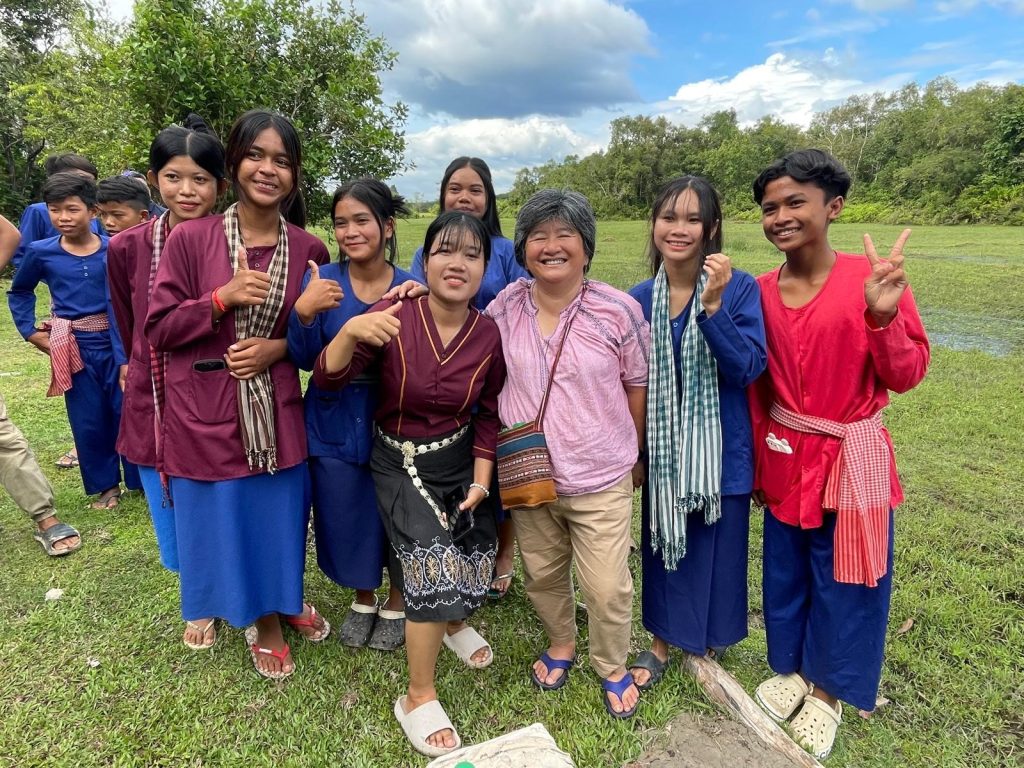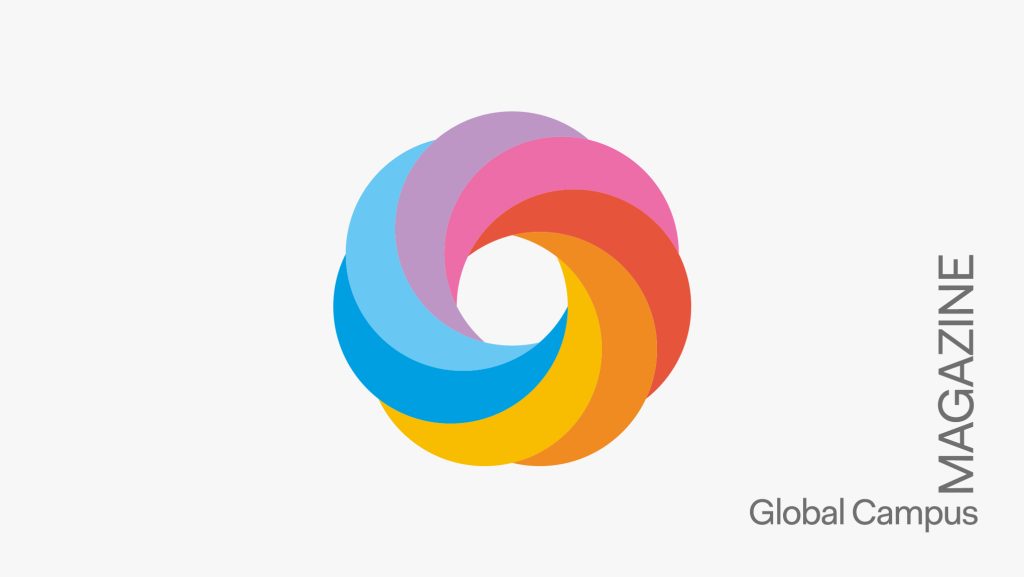The Press Office of the Global Campus of Human Rights had the pleasure to interview the 2024 Right Livelihood Laureate Joan Carling about her activism, achievements and aspirations for the future.
Please share with us about your background and role as an activist and advocate for Indigenous rights with more than 30 years of experience.
I am an Indigenous woman from the Cordillera region of the Philippines. Growing up, I witnessed firsthand the struggles of our communities against land dispossession and environmental destruction caused by large-scale development projects. Such as large dams and commercial mining. These early experiences instilled in me a deep sense of responsibility to defend our ancestral lands, culture, and way of life. Working at the grassroots level for over a decade allowed me to connect deeply with the realities and aspirations of Indigenous communities. This foundation shaped my commitment to advocate for Indigenous peoples’ rights, self-determination, and environmental justice.
Over the years, my work has expanded from local advocacy to national, regional and global engagements. As the Secretary-General of the Asia Indigenous Peoples Pact (AIPP), I worked closely with other Indigenous leaders and colleagues in raising awareness on the rights of Indigenous Peoples through the production and distributions of simple and culturally sensitive educational materials including on the UN Declaration on the Rights of Indigenous Peoples (UNDRIP). We have also conducted series of trainings and workshops to strengthen the skills and capacities of Indigenous leaders including Indigenous Women and to strengthen solidarity among Indigenous communities across Asia. We compiled stories of grassroots Indigenous Women leaders and published it as “Her Stories” raising the visibility of the leadership, courage and aspirations of Indigenous women at the frontline of their community struggles. I have collaborated with Indigenous leaders from different regions and with civil society organizations for advocacy activities at the regional and global levels to address systemic discrimination and human rights violations with impunity. Now, as part of the Indigenous Peoples Rights International (IPRI), I continue to champion these causes and amplify the voices of Indigenous peoples worldwide.
How was being recognized as a Right Livelihood Award 2024 recipient, and how did it help with your activities and mission to boost urgent and long-term social change?
Receiving the Right Livelihood Award is both a profound honor and a significant responsibility. It not only recognizes the resilience and contributions of Indigenous communities but also amplifies our voices on the global stage. The award has brought much-needed visibility to the struggles and achievements of Indigenous peoples, particularly environmental defenders who face increasing threats.
This recognition has opened doors to broader platforms for dialogue, strengthened our partnerships with like-minded organizations, and will hopefully mobilize support for urgent and long-term advocacy. It reaffirms the critical need to address systemic injustices and bolster movements for social change. For IPRI, this award may boost to our campaigns, enabling us to expand our work to end the criminalization of Indigenous environmental defenders and advocate for policies that uphold human rights and environmental justice.
What is the current situation in your country, and how are you benefiting from this visibility? How could we support your cause?
In the Philippines, Indigenous peoples face relentless challenges, including systemic marginalization, discrimination, militarization, and threats to their territories from mining, agribusiness, tourism, and large-scale infrastructure projects including energy projects. Environmental defenders, in particular, are at great risk. Inspite of the law recognizing the rights of Indigenous Peoples, the vested interest of those in power continue to ensure control of Indigenous Peoples lands and resources. Indigenous leaders and communities defending their rights are thereby often subjected to harassment, intimidation, criminalization with trumped up charges violence, harassment, and even killings. Four of my colleagues at the Cordillera Peoples Alliance (CPA) are presently facing charges of terrorism. Further, an increasing number of legal organization providing development support to marginalized indigenous communities are now facing charges of financing terrorism for their invaluable work in reaching far flung villages.
The visibility brought by this award has helped shine a spotlight on these critical issues, mobilizing solidarity and action from international allies, civil society, and the media. It has also created opportunities to engage with governments and institutions on Indigenous rights and environmental justice.
To support our cause, I encourage you to amplify Indigenous voices and advocate for the implementation of international human rights standards particularly the UN Declaration on the Rights of Indigenous Peoples. Supporting grassroots initiatives, promoting responsible corporate practices, and funding community-led projects are other meaningful ways to contribute. Solidarity and advocacy from allies play a crucial role in driving systemic change and empowering Indigenous Peoples communities.
What is your opinion on the importance of human rights education in the field of environmental justice and Indigenous rights?
Human rights education is fundamental to achieving environmental justice and protecting Indigenous rights. It builds awareness, empowers communities, and equips individuals with the tools to challenge injustices and advocate for systemic change. For Indigenous peoples, environmental justice is deeply intertwined with human rights, as our survival is directly connected to the health of our lands and ecosystems.
By integrating Indigenous perspectives into human rights education, we can emphasize the interconnectedness of human rights, cultural diversity, environmental sustainability and social justice. This approach not only fosters empathy and respect but also strengthens the global movement for equitable and sustainable futures.
What are the most important challenges ahead in the field of Human Rights and Democracy in the world? Could educational programs like ours at the Global Campus of Human Rights contribute to creating a safe space for discussion on these challenges?
The challenges to human rights and democracy are immense. Shrinking civic spaces, the rise of authoritarianism, and the criminalization of human rights defenders are pervasive. For Indigenous peoples, these challenges are compounded by land dispossession, resource exploitation, and violence against defenders.
Educational programs like those at the Global Campus of Human Rights are vital in addressing these issues. They create safe spaces for critical dialogue, foster international solidarity, and equip future leaders with the knowledge and tools to confront these challenges. By prioritizing intersectionality and the protection of marginalized sectors, such programs can inspire real solutions and transformative action.
Could you give a message to the students, professors, alumni, partners, and staff of the Global Campus of Human Rights?
To all of you at the Global Campus of Human Rights: Your dedication to advancing human rights education and fostering global justice is a beacon of hope in these challenging times. You are fostering intergenerational understanding, commitments and actions in advancing human rights. You are building a community that values equality, dignity, and sustainability—principles that are essential for a just future.
I encourage you to center the voices of marginalized communities as rights holders, especially Indigenous peoples, in your work. Approach your advocacy in the spirit of partnership and solidarity, humility, and a commitment to listening and learning. Together, we can create a world where human rights are not just ideals but lived realities for all. Your work has the power to inspire change and transform lives—thank you for your unwavering commitment. Let us continue to walk this path of hope and courage, fostering solidarity and action for a better world.
For more information contact our Communications and Press Offices:
Elisa Aquino – Isotta Esposito – Francesca Sante – Carlotta Brunetta
pressoffice@gchumanrights.org - communications@gchumanrights.org
Read interviews and updates in our seasonal digital Global Campus of Human Rights Magazine to be informed about the latest News, Events and Campaigns with our local and international unique community of donors, partners and friends.
Stay tuned for the 15th issue of the Magazine coming soon in March in English and Italian.
#GCHumanRights
#GCHumanRightsPress
#GCHumanRightsMagazine

